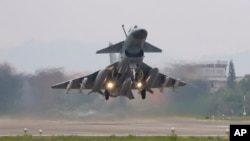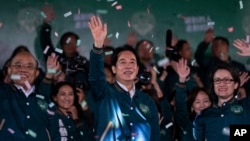The record third win for Taiwan's most independence-leaning party in Saturday’s presidential election has sparked calls for war from Chinese nationalists who are losing patience, despite more than 70 years of status quo, and want to see the island forcefully reunified with the mainland.
The ruling Democratic Progressive Party’s candidate Lai Ching-te, who was Taiwan’s vice president, was elected the self-governing island’s new president by just over 40% of the vote, which he said in his victory speech told the international community that “between democracy and authoritarianism, we will stand on the side of democracy.”
The more China-friendly Kuomintang (KMT) candidate Hou Yu-ih won just over a third of the vote and the Taiwan People’s Party candidate Ko Wen-je received over a quarter of ballots cast.
The DPP has said it is open to talks with Beijing, which has so far rejected them while stepping up military probing and threats to Taiwan and underscoring its plans to one day reunify it with China, by force if necessary.
Chinese officials had characterized the election as a choice for Taiwan between peace and war.
But it is mainland Chinese nationalists who seem to listening to that message.
In interviews with VOA, mainland Chinese reacted to the election result with calls for China to make good on its threat to force Taiwan’s reunification.
They asked VOA only use their last names due to safety concerns.
Mr. Ni, a media worker in China’s south-central Hunan Province, said people around him didn't talk about the Taiwan election publicly, but they did very passionately in private. "Liberating Taiwan was the main theme," he said, without clarifying what China would be liberating the self-governing, democratic island from.
He added that nationalism was rising in China with more calls to invade Taiwan to forcefully reunify it with the mainland.
In China’s southeastern coastal province of Fujian, Mr. Gao in the capital, Fuzhou, said he was "very pleased" about Lai's win because it could speed up the pace of military reunification with China. "War is inevitable, and the central government has already made arrangements," he said, adding that democracy and freedom were in his view just slogans for politicians to obtain power and political capital.
Nationalists on the Chinese internet also declared that reunifying Taiwan by force was the only option. One comment under the name of “Star Sky Strawberry Little White” said, "The voting has shown the public opinion on the other side (of the strait). It's not a minority, but a considerable majority. There is no way to save Frog Island [meaning Taiwan]. Give up your illusions and militarily reunify it."
"This matter cannot be delayed any longer," wrote the well-known nationalist social media influencer Midnight Knight, who has more than 1 million followers on Weibo, the Chinese equivalent of X, the social media platform formerly known as Twitter. "It's better to fight early than late, and it's better to fight big than small."
An online survey published by the North America-edited Journal of Contemporary China in May 2023 showed more than half of mainland respondents favored unifying Taiwan by force.
Mr. Xu, a Hong Kong analyst born in mainland China who also declined to give his full name due to security concerns, told VOA that Lai's win will push Taiwan in the direction of war, especially as China sanctions his deputy, Hsiao Bi-khim, for advocating for Taiwan's independence, which will create barriers to Taiwan's international economic and trade investments.
"Lai's reputation in mainland China is very bad. When (President) Tsai Ing-wen came to power in 2016, her reputation in mainland China was very good. Lai doesn't have this honor,” he sai
But there are exceptions to mainland Chinese pushing for war or who see military conflict as inevitable, including some who see Taiwan’s election as an example that China could one day follow.
Mr. Zhang, who lives in China’s eastern coastal province of Jiangsu, told VOA that on Taiwan's election day, his social media groups were flooded with news about the vote. "This positive signal shows that more and more Chinese are observing how democracy works in Taiwan," he said, adding that only when China has democratic voting can the Taiwan Strait be safe.
Despite the authoritarian one-party state’s efforts to disparage and limit discussion of Chinese electing their own leaders in Taiwan, the election was one of the most searched topics on Weibo, garnering more than 163 million post views Saturday before authorities blocked it.
A spokesman for China’s Taiwan Affairs Office on Wednesday said that Beijing’s refusal to swear off the use of force is not targeted at “Taiwan compatriots” but at “interference from external forces” and what he called the ”tiny number of Taiwan independence separatists and their separatist activities."
Polls among people in Taiwan have shown the vast majority of people prefer to keep their sovereignty and that most identify as Taiwanese - not Chinese.
Taiwan split from China during the 1940s Chinese civil war, which saw the Chinese Communist Party (CCP) rise to power and the defeated nationalist Kuomintang army flee to the island, which transitioned to democracy in the 1990s while China remained under CCP rule.
The U.S., which does not support Taiwan declaring independence but has vowed to defend it from any effort by Beijing to take the island by force, congratulated Lai on his victory and the people of Taiwan for demonstrating the strength of their democratic system.
Adrianna Zhang and Wenhao Ma contributed to this report.





